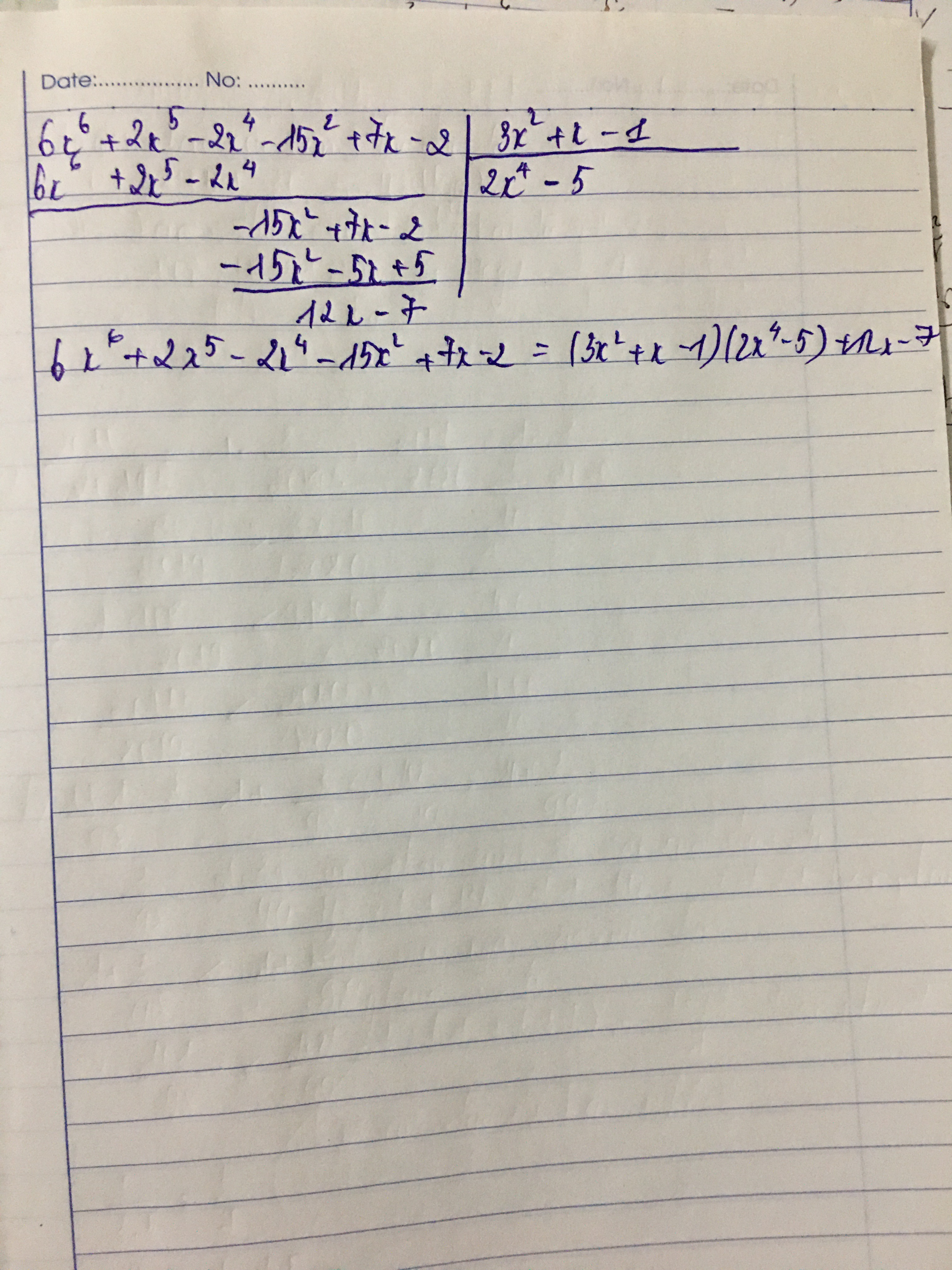(3x-5)^2-(2x+1)^2-5(x-1)(x+1) =15x-20
Hãy nhập câu hỏi của bạn vào đây, nếu là tài khoản VIP, bạn sẽ được ưu tiên trả lời.


\(2\left(x+1\right)=5x+7\\ \Leftrightarrow2x+2=5x+7\\\Leftrightarrow 2x-5x=-2+7\\\Leftrightarrow -3x=5\\ \Leftrightarrow x=-\frac{5}{3}\)
Vậy phương trình trên có nghiệm là \(-\frac{5}{3}\)
\(3x-1=x+3\\ \Leftrightarrow3x-x=1+3\\ \Leftrightarrow2x=4\\\Leftrightarrow x=2\)
Vậy phương trình trên có nghiệm là \(2\)
\(15-7x=9-3x\\\Leftrightarrow -7x+3x=-15+9\\\Leftrightarrow -4x=-6\\ \Leftrightarrow x=\frac{3}{2}\)
Vậy phương trình trên có nghiệm là \(\frac{3}{2}\)
\(2x+1=15x-5\\ \Leftrightarrow2x-15x=-1-5\\ \Leftrightarrow-13x=-6\\ \Leftrightarrow x=\frac{6}{13}\)
Vậy phương trình trên có nghiệm là \(\frac{6}{13}\)
\(3x-2=2x+5\\ \Leftrightarrow3x-2x=2+5\\ \Leftrightarrow x=7\)
Vậy phương trình trên có nghiệm là \(7\)

g) \(\left(2x-1\right)^2-\left(2x+4\right)^2=0\)
\(\Leftrightarrow\left(2x-1+2x+4\right)\left(2x-1-2x-4\right)=0\)
\(\Leftrightarrow-5\left(4x+3\right)=0\)
\(\Leftrightarrow4x+3=0\)
\(\Leftrightarrow4x=-3\)
\(\Leftrightarrow x=\frac{-3}{4}\)
Vậy tập nghiệm của pt là \(S=\left\{\frac{-3}{4}\right\}\)
h) \(\left(2x-3\right)\left(3x+1\right)-x\left(6x+10\right)=30\)
\(\Leftrightarrow3x\left(2x-3\right)+\left(2x-3\right)-6x^2-10x=30\)
\(\Leftrightarrow6x^2-9x+2x-3-6x^2-10x=30\)
\(\Leftrightarrow-9x+2x-3-10x=30\)
\(\Leftrightarrow-17x-3=30\)
\(\Leftrightarrow-17x=33\)
\(\Leftrightarrow x=\frac{-33}{17}\)
Vậy tập nghiệm của pt là \(S=\left\{\frac{-33}{17}\right\}\)

a/ 2x\(^{^{ }3}\)-3\(^{^{ }3}\)-2x\(^3\)-1\(^{^{ }3}\)=-28
b/x\(^{^{ }3}\)+2\(^{^{ }3}\)-x\(^3\)+2=10
c/3x\(^3\)+5\(^3\)-3x(3x\(^2\)-1)=3x\(^3\)+5\(^3\)-3x\(^3\)+3x=125+3x
d/ x\(^6\)-(x\(^3\)+1)(x\(^2\)-x+1)= x\(^6\)-(x\(^6\)-x\(^4\)+x\(^3\)+x\(^2\)-x+1)=x\(^4\)-x\(^3\)-x\(^2\)+x-1


a, 15x3 - 15x = 0
15x(x2-1)=0
15x=0 hoặc x2-1=0 (tự tính nhoa)
b,3x2-6x+3=0
3(x2-2x+1)=0
x2 -2x+1=0:3=3
x2-2x=3-1=2
x(x-2)=0
x=0 hoặc x-2=0 (tự tính nhoa)
Bài làm
a) 15x3-15x=0
<=> 15x( x2 - 1 ) = 0
<=> \(\orbr{\begin{cases}15x=0\\x^2-1=0\end{cases}\Leftrightarrow\orbr{\begin{cases}x=0\\x=\pm1\end{cases}}}\)
Vậy x = { 0; + 1 }
b) 3x2 - 6x + 3 = 0
<=> 3( x2 - 2x + 1 ) = 0
<=> x2 - 2x + 1 = 0
<=> ( x - 1 )2 = 0
<=> x - 1 = 0
<=> x = 1
Vậy x = 1
c) 5(x - 1) - 3x(1 - x) = 0
<=> 5(x - 1) + 3x(x - 1) = 0
<=> (5 + 3x)(x - 1) = 0
<=> \(\orbr{\begin{cases}5+3x=0\\x-1=0\end{cases}\Leftrightarrow\orbr{\begin{cases}x=-\frac{5}{3}\\x=1\end{cases}}}\)
Vậy x = { -5/3; 1 }
e) -7(x + 2) = 2x(x + 2)
<=> -7(x + 2 ) - 2x( x + 2 ) = 0
<=> (x + 2)(-7 - 2x) = 0
<=> \(\orbr{\begin{cases}x+2=0\\-7-2x=0\end{cases}\Leftrightarrow\orbr{\begin{cases}x=-2\\x=-\frac{7}{2}\end{cases}}}\)
Vậy x = { -2; x = -7/2 }
f)(2x - 3)(3x + 5) = (x - 1)(3x + 5)
<=> (2x - 3)(3x + 5) - (x - 1)(3x + 5) = 0
<=> (3x + 5)(2x - 3 - x + 1) = 0
<=> (3x + 5)(x - 2) = 0
<=> \(\orbr{\begin{cases}3x+5=0\\x-2=0\end{cases}\Leftrightarrow\orbr{\begin{cases}x=-\frac{5}{3}\\x=2\end{cases}}}\)
Vậy x = { -5/3; 2 }


\(\dfrac{4x^2-3x+5}{x^3-1}-\dfrac{1+2x}{x^2+x+1}-\dfrac{6}{x-1}\)
\(\Leftrightarrow\dfrac{4x^2-3x+5}{\left(x-1\right)\left(x^2+x+1\right)}-\dfrac{1+2x}{x^2+x+1}-\dfrac{6}{x-1}\)
\(ĐKXĐ:x\ne1\)
\(\dfrac{4x^2-3x+5}{\left(x-1\right)\left(x^2+x+1\right)}-\dfrac{(1+2x)\left(x-1\right)}{(x^2+x+1)\left(x-1\right)}-\dfrac{6\left(x^2+x+1\right)}{(x-1)\left(x^2+x+1\right)}\)
\(\Rightarrow4x^2-3x+5-\left(1+2x\right)\left(x-1\right)-6\left(x^2+x+1\right)\)
\(\Rightarrow4x^2-3x+5-\left(x-1+2x^2-2x\right)-6x^2-6x-6\)
\(\Rightarrow4x^2-3x+5-x+1-2x^2+2x-6x^2-6x-6\)
\(\Rightarrow-4x^2-8x\)
⇒-4x(x-4)
